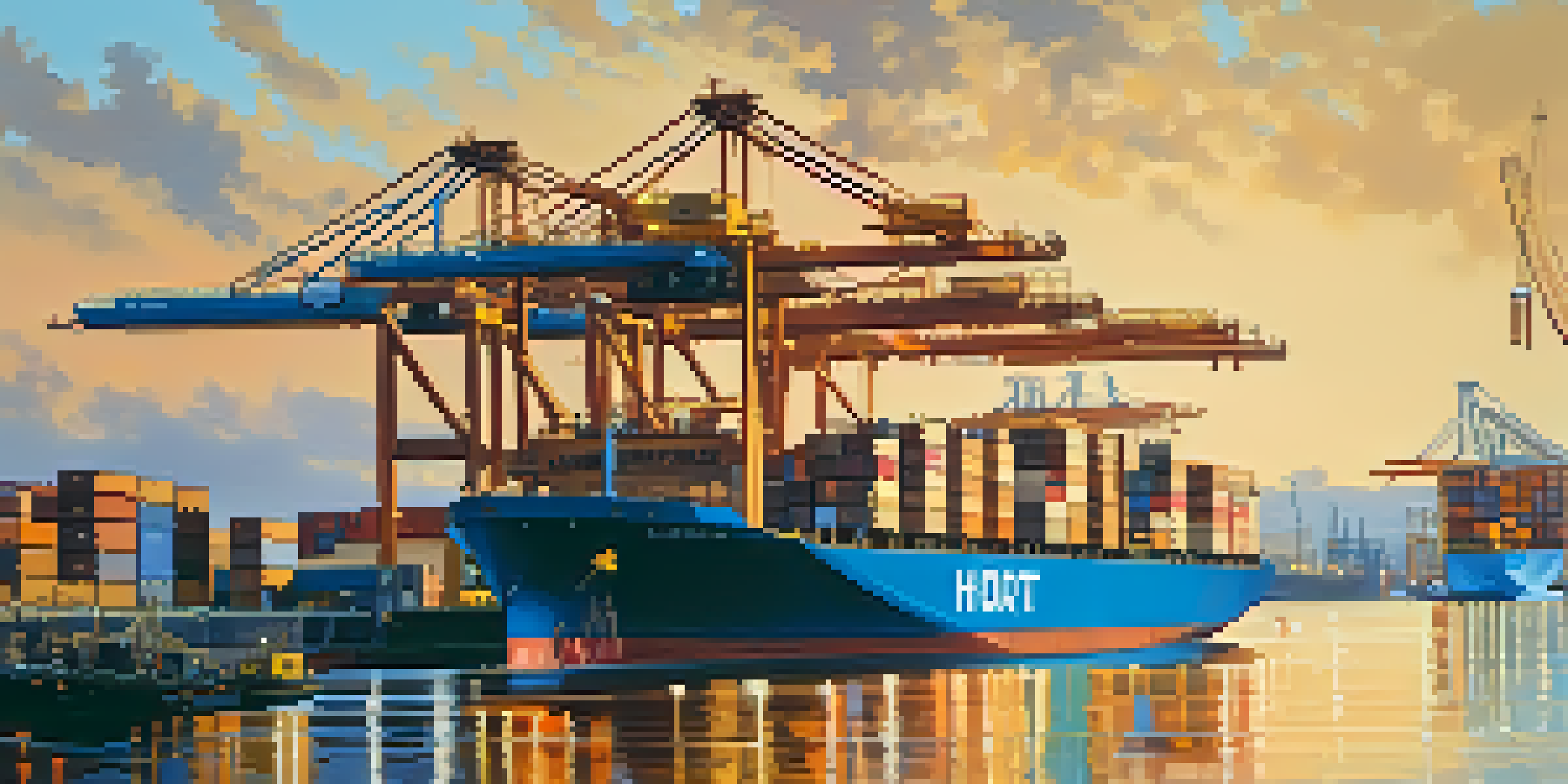Trade in Texas: A Gateway to Global Economic Opportunities

Texas: A Strategic Trade Hub in the U.S.
Texas stands out as a vital trade hub in the United States, thanks to its strategic location. The state shares a border with Mexico, which opens doors to international markets and facilitates cross-border trade. Additionally, major cities like Houston, Dallas, and San Antonio serve as critical points for shipping and logistics, connecting Texas to the rest of the world.
Trade is a vital part of our economy, and we must make sure we have the right infrastructure and agreements in place to support it.
This strategic advantage has led to the establishment of numerous trade routes and partnerships that benefit local businesses and global companies alike. For instance, the Port of Houston is one of the busiest ports in the country, handling a vast array of goods and commodities. As trade continues to evolve, Texas remains at the forefront, embracing opportunities that arise from its geographical benefits.
Furthermore, Texas boasts a diverse economy that includes agriculture, technology, and manufacturing sectors. This variety not only strengthens the state’s trade capabilities but also makes it an attractive destination for foreign investment. As businesses seek to expand their reach, Texas serves as a gateway, offering both resources and connections.
The Role of Texas Ports in Global Trade
Texas is home to several major ports, each playing a crucial role in international trade. The Port of Houston, for example, is a significant entry point for goods from around the globe, including energy products and consumer goods. This bustling port facilitates not just imports, but also exports, allowing Texas businesses to share their products with international markets.

In addition to Houston, the Port of Corpus Christi and the Port of Galveston also contribute to Texas's trading prowess. These ports handle a variety of cargo and are instrumental in supporting Texas’s oil and gas industry, which has a strong global demand. The efficiency and capacity of these ports help ensure that Texas maintains its competitive edge in the international arena.
Texas: A Global Trade Powerhouse
Texas's strategic location and major ports position it as a vital hub for international trade.
Moreover, investments in infrastructure and technology at these ports continue to enhance their capabilities. With advanced shipping techniques and improved logistics, Texas ports are becoming more adept at handling larger volumes of trade. This evolution not only boosts the local economy but also strengthens Texas's position as a vital player in global commerce.
Texas Trade Agreements: A Catalyst for Growth
Trade agreements play a significant role in expanding Texas's economic prospects. Agreements like the United States-Mexico-Canada Agreement (USMCA) facilitate smoother trade between Texas and its neighboring countries. By reducing tariffs and encouraging investment, these agreements create a more favorable environment for businesses to thrive.
Texas is the gateway to the world, and our ports are the lifeblood of our economy, facilitating trade and creating jobs.
Additionally, Texas actively seeks out new trade partnerships with countries around the world. These efforts not only open new markets for local products but also attract foreign companies looking to establish a presence in the U.S. The proactive approach to forming trade agreements demonstrates Texas's commitment to global economic engagement.
As these agreements evolve, they not only benefit large corporations but also empower small and medium-sized enterprises. By providing access to international markets, Texas allows local businesses to expand their reach and increase their competitiveness. This ripple effect fosters job creation and economic growth across the state.
Diverse Industries Driving Texas Trade
Texas is known for its diverse industries, which are instrumental in driving trade. The state’s economy includes a robust mix of sectors, such as energy, technology, agriculture, and manufacturing. This variety ensures that Texas has a wide range of products to offer in the global marketplace, making it an attractive partner for trade.
For example, Texas leads the nation in energy production, particularly oil and natural gas. This dominance allows the state to export significant quantities of energy resources to countries around the world. Similarly, the agricultural sector produces a wealth of goods, from cattle and cotton to fruits and vegetables, further enhancing Texas's trade portfolio.
Diverse Industries Fueling Trade
The state's varied economy, including energy, agriculture, and technology, enhances its trade capabilities.
Moreover, the technology sector in Texas is rapidly growing, with companies in Austin and Dallas leading the charge. This innovation-driven landscape creates new opportunities for trade in high-tech products and services. As these industries continue to evolve, Texas is well-positioned to adapt and thrive in the global economy.
Workforce Development and Trade in Texas
A skilled workforce is vital for sustaining Texas's trade success, and the state places a strong emphasis on workforce development. Educational institutions, including universities and vocational schools, collaborate with businesses to ensure that graduates are equipped with the necessary skills for the job market. This focus on education helps create a talent pool ready to meet the demands of diverse industries.
Furthermore, Texas offers various training programs aimed at enhancing workforce skills in sectors like logistics and manufacturing. By investing in employee development, Texas not only improves its competitive advantage but also attracts businesses seeking a reliable workforce. This commitment to education and training fosters a robust trade ecosystem.
As industries evolve and global demands shift, Texas remains dedicated to adapting its workforce strategies. By prioritizing skill development and continuous learning, the state ensures that its workforce can meet the challenges of international trade head-on. This adaptability is crucial for maintaining Texas's status as a leading trade player.
Challenges Facing Texas in Global Trade
While Texas enjoys many advantages in trade, it also faces challenges that require attention. Issues such as supply chain disruptions, fluctuating commodity prices, and trade tensions can impact the state's economy. For businesses relying on international markets, these factors can create uncertainty and necessitate strategic adjustments.
Moreover, competition from other states and countries is a constant reality in the trade landscape. As various regions strive to attract investment and business opportunities, Texas must continuously innovate to maintain its competitive edge. This means fostering a business-friendly environment while addressing challenges that could hinder trade growth.
Workforce Development Drives Success
Investments in education and training ensure that Texas's workforce is prepared to meet the demands of global trade.
Lastly, regulatory hurdles can pose obstacles for businesses looking to engage in international trade. Navigating complex regulations can be daunting, particularly for small and medium-sized enterprises. By simplifying processes and providing support, Texas can help businesses overcome these barriers and capitalize on global economic opportunities.
The Future of Trade in Texas
Looking ahead, the future of trade in Texas appears promising, with numerous opportunities on the horizon. As global markets continue to evolve, Texas is well-positioned to adapt and thrive. The state’s commitment to innovation, skilled workforce, and strategic trade agreements will play crucial roles in shaping its trade landscape.
Emerging technologies, such as automation and digital trade platforms, are also set to transform the way Texas engages in global commerce. By embracing these advancements, Texas businesses can streamline operations and enhance their competitiveness in the international market. This tech-savvy approach will be vital in navigating the complexities of modern trade.

Ultimately, Texas's resilience and adaptability will be key to its continued success in global trade. As the state embraces new opportunities and tackles challenges head-on, it will solidify its position as a gateway to economic opportunities for businesses and communities alike. The future of trade in Texas is bright, and the possibilities are endless.